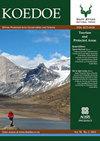蛙泳作为南非国家公园生态旅游产品的潜力
IF 1.1
4区 环境科学与生态学
Q3 BIODIVERSITY CONSERVATION
引用次数: 0
摘要
在全球生物多样性丧失的背景下,寻找保护生物多样性的实用工具和解决方案十分重要。生态旅游是国际旅游业中发展最快的部门,可以成为鼓励人们保护自然环境的有力保护工具。传统上,青蛙并没有引起生态旅游者的太多关注,部分原因是它们很容易被其他更有魅力的物种或栖息地景点所掩盖。在国际自然保护联盟(IUCN)列出的近7000种已知两栖动物中,有近三分之一受到威胁,对它们的保护至关重要。在青蛙保护协会中,froging是一个众所周知的术语,用来描述在野外寻找青蛙的活动。这可以与其他生态旅游活动相结合,吸引游客,在享受乐趣的同时,创造对保护青蛙的兴趣。其目的是确定青蛙在南非的生态旅游潜力,主要是通过向游客分发调查问卷,以获取他们是否有兴趣参加南非国家公园内与青蛙有关的生态旅游活动的信息。本研究采用定量研究方法,即非概率抽样,采用便利抽样。设计了一份在线调查(问卷)来收集研究数据。调查结果令人满意,因为潜在的游客表示他们想参加与青蛙有关的活动。该项目提供了保护青蛙、教育游客和在当地社区创造就业机会的机会。它还将为南非国家公园创造一种新的旅游产品。保护意义:本研究对保护的贡献在于通过生态旅游使青蛙保护受益。本文章由计算机程序翻译,如有差异,请以英文原文为准。
The potential of frogging as an ecotourism product for South African National Parks
Amid global biodiversity loss, it is important to find practical tools and solutions in order to protect biodiversity. Ecotourism is the fastest-growing sector of the international travel industry and can be a powerful conservation tool that encourages people to protect the natural environment. Traditionally, frogs have not generated much attention among ecotourists, partly because they are easily overshadowed by other more charismatic species or habitat attractions. With almost a third of the nearly 7000 known amphibian species listed as threatened by the International Union for Conservation of Nature (IUCN), their protection is crucial. Frogging is a well-known term within the frog conservation society, describing the activity of searching for frogs in the wild. This can be combined with other ecotourism activities to attract tourists and create an interest in the conservation of frogs while having fun at the same time. The aim was to determine the ecotourism potential of frogs in South Africa, primarily by distributing questionnaires to tourists to retrieve information on whether they would be interested in participating in frog-related ecotourism activities within the South African National Parks. For this research, a quantitative research approach was followed, namely non-probability sampling, to which convenience sampling was applied. An online survey (questionnaire) was designed to collect the data for the research. The survey outcome was satisfactory, as potential tourists indicated that they would like to participate in frog-related activities. The project offers the opportunity to conserve frogs, educate tourists, and create job opportunities within the local communities. It will also create a new tourism product for the South African National Parks.Conservation implications: The contribution of this research to conservation lies in the opportunity to benefit frog conservation through ecotourism.
求助全文
通过发布文献求助,成功后即可免费获取论文全文。
去求助
来源期刊

Koedoe
BIODIVERSITY CONSERVATION-
CiteScore
3.30
自引率
0.00%
发文量
10
审稿时长
20 weeks
期刊介绍:
Koedoe, with the subtitle ''African Protected Area Conservation and Science'', promotes and contributes to the scientific (biological) and environmental (ecological and biodiversity) conservation practices of Africa by defining the key disciplines that will ensure the existence of a wide variety of plant and animal species in their natural environments (biological diversity) in Africa.
 求助内容:
求助内容: 应助结果提醒方式:
应助结果提醒方式:


